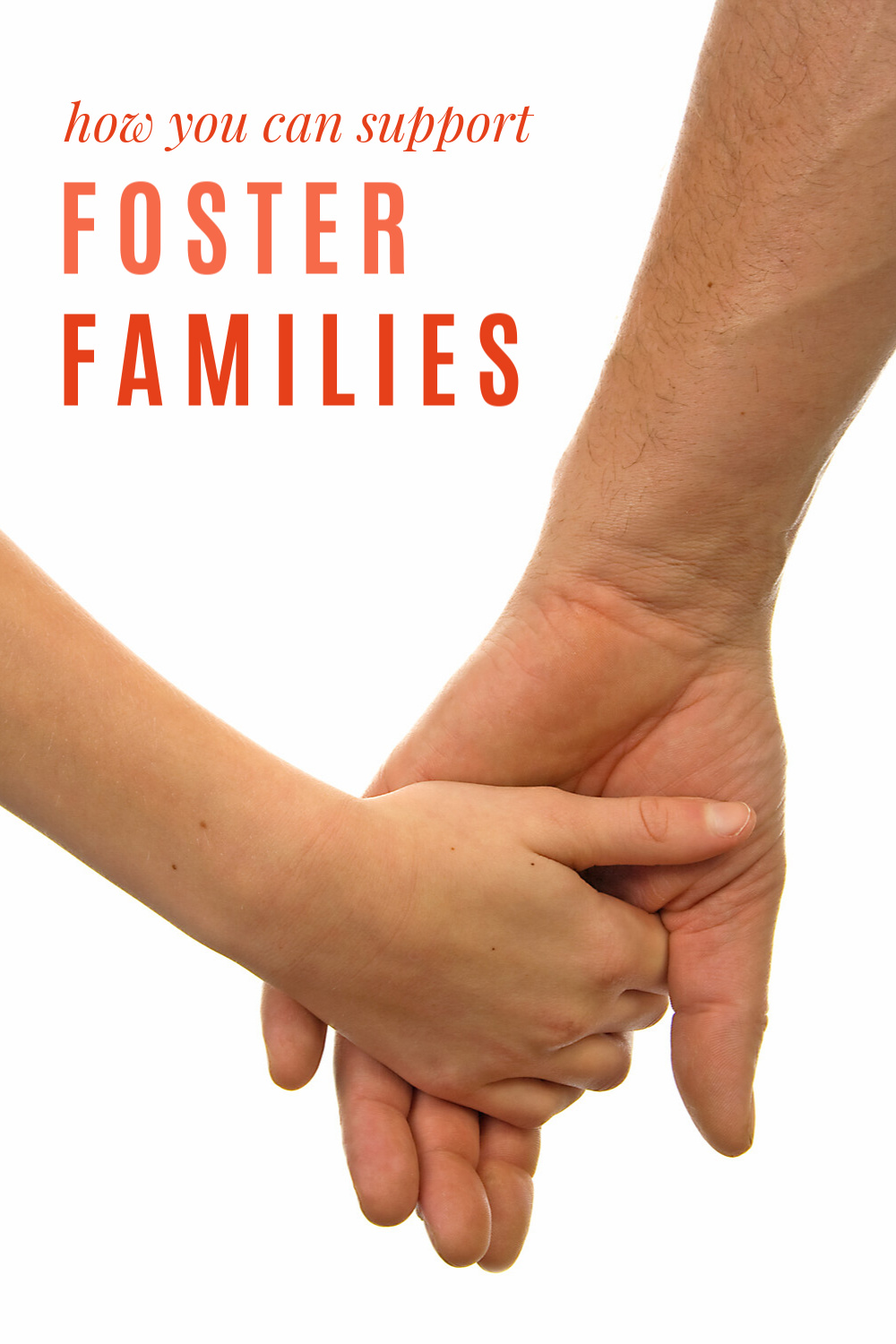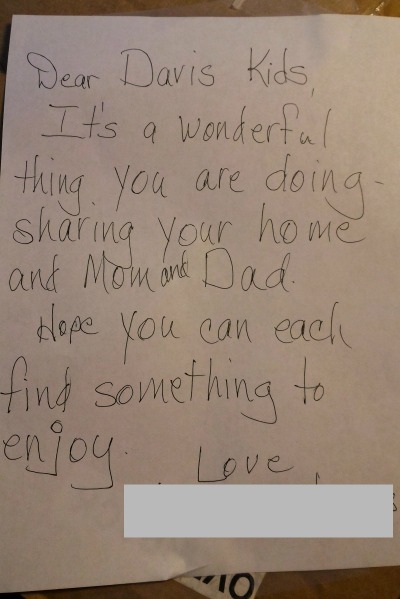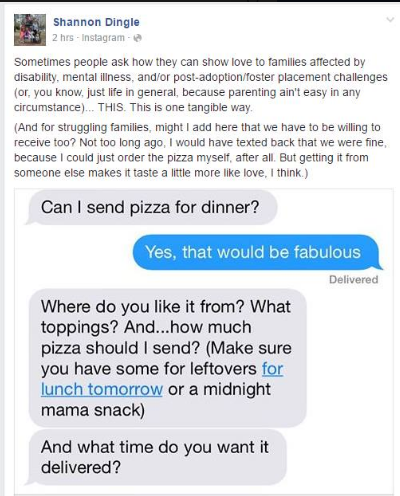
Foster Parent Support
My husband and I spent a few years as foster parents in the state of Oregon and we’d learned a whole lot along the way. The most important lesson for us?
How critical it is for us to be surrounded by people willing to help us carry the burden of fostering.
There isn’t any shortage of people and organizations who want to help foster kids. Seriously, if I took advantage of all the groups that offer free stuff to my foster children, the area under our Christmas tree would have been filled and our dresser drawers would have been packed.
But support for foster families? The ones on the front lines, parenting and advocating for the most vulnerable children in our communities 24 hours a day? Very, very little. From many foster families’ perspective, much is required but little support is offered by the state agency or our community.
Burnout is high with foster families and I know that the more support a family receives, the more likely it is that they will continue fostering. And it’s really in all of our best interest for healthy foster families to continue to foster.
So, will you help carry the giant burden foster families are carrying?
Here are ways you can support families fostering in your community.
(I include families who have adopted out of foster care in this group as well. These amazing people are IN THE TRENCHES and often have less institutional support than foster parents do. Just because a child is in their forever family does not mean their problems are solved. So, if you know someone who has adopted a child coming from a traumatic background, use this list to serve them as well.)

If you personally know a family fostering:
Communicate.
Text, call, email. Ask how they are doing. Ask what you can do to make their lives easier. Let them know you are thinking of them, praying for them, rooting for them.
Get background checked.
I cannot think of anything more encouraging to a foster parent than to hear from a friend, “I would like to get background checked so I can serve you without restrictions.” Yes, you can do a whole lot without getting a background check, but you will be available in an emergency to do overnight care, regular transportation, or regular babysitting. Getting a background check from your state’s agency doesn’t obligate you to anything, but it does allow you to be a family’s back-up in a pinch.
Offer respite.
Respite is similar to babysitting, but is more formal and regular. It is most often providing overnight care so foster families can rest, recharge, and reconnect with their core family. Foster families desperately need respite, but often don’t use it because they don’t have anyone who has offered to help.
The most ideal arrangement is for you to do respite regularly (one weekend a month, every other Saturday afternoon) and with the same family. For instance, an older couple in our church watched our two foster kids for the weekend, once a month. This couple became like an extra set of grandparents and our fosters adored them.
In Oregon, you just have to fill out the official background check and you’re ready. You can get the forms from the foster family.
Run errands.
Go grocery shopping. Make a Costco run. Pick up prescriptions (all kids in foster care get free medical care, so you won’t have to pay for anything). Drop off diapers and wipes or order supplies from Amazon and have them delivered.
Offer your gently used baby stuff.
Families who foster babies are in the greatest need of “stuff.” Car seats, bottles, clothing, or other equipment. Want to be even more awesome? Offer to store the items in your garage and bring it over when it’s needed. Foster families already store an enormous amount of gear for future placements, it would be nice to not have one more thing to house.
Babysit.
Watch all the kids, just the fosters, or just the family’s biological kids. Whatever you have the capacity for and whatever the foster parents need to catch their breath. I can’t speak for other states, but in Oregon, I can have people that I personally trust babysit my foster kids as long as it’s not regular.
Bring food.
Some families like home cooked meals and some prefer take-out. Many families are managing kids with complex dietary needs and it’s just easier to say, “Get this particular meal at Panda Express.”
And pay special attention to the first three weeks of a new placement. It’s usually absolute chaos during those first couple of weeks. There are tons of appointments, in-home visits and assessments, visits with the family, and everyone adjusting to each other. The very last thing these parents want to think about it is how in the world are they going to feed everyone.
Just BRING THEM FOOD. Bring them gift cards to restaurants with a good take-out menu close by. Drop off a bag of groceries with fruit, vegetables, and plenty of snack foods. Bring a handful of freezer meals. Don’t ask, just do it.
Organize playdates.
Foster parents often spend much of their day inside the house, so it’s lovely to be able to play with others.
You could also invite one kid over to play and give the parent the option to choose who will go. I offered to watch my friend’s foster children one afternoon and she asked if she could send her bio son instead, saying, “He never gets to do fun stuff anymore because all of our time is taken up with the foster kids.” Done and done. Simply say, “I have one extra pass to the Children’s Museum. Which kid can I take for the afternoon?”
Welcome the WHOLE family over for dinner, lunch, or a playdate.
When families start fostering, the first thing to go is usually invitations for social gatherings which can feel incredibly isolating. People without personal exposure to foster kids imagine them much more destructive and disruptive than many of them are in reality. Yes, it may be chaotic and there may be some messes, but foster families need social interaction. So keep the invitations coming.
And as an encouragement, most foster families are as gracious as they come and we have very low expectations. No one cares what food you serve or what your house looks like. They are just thrilled to be important enough to you to overlook the unique set of circumstances they bring to the table.
Be “hands and feet” for a family.
Offer to do whatever the foster parent needs once a week for two hours. Basically, you’re Alice from the Brady Bunch. Fold laundry, read to a child, wash the dishes, run an errand, make dinner, scrub a toilet, sort through clothes, sit and have adult talk over coffee. Whatever they need at that moment, you do it.

Include all children in activities.
If the family’s foster child is within the age range of the event you are planning, please invite them. Obviously, it’s understandable that perhaps the foster child isn’t going to be invited to a super special birthday party, but if it’s a bigger group event, include everyone in the family.
Many children in foster care have never attended a real birthday party or an actual playdate. You will blow their little minds with the balloons and cake and party favors, plus it is an excellent opportunity to teach your child how to serve.
Create a memory book.
When children leave foster care to either be reunited with their biological parents or move to an adoptive family, foster parents are encouraged to send them with some sort of a memory book filled with pictures, stories, and other mementos from their time in that home.
For the less crafty foster parents, this is probably not going to happen. (Remember the part about high expectations and requirements of foster parents with the lack of support and resources?) Offer to take the foster family’s pictures and make a scrapbook with blank areas for the foster family to add in written captions.
Pay for a class, summer camp, or a haircut.
I personally believe that Oregon offers fair reimbursement for the basics of caring for a child in foster care: food, clothing, shelter, toiletries, and maybe one activity, but anything extra typically comes out of the foster parent’s wallet. Offer to pay for a portion or all of their sports fees or camp tuition. Give the family a gift certificate to a local hair salon. Show up with a bag filled with new socks.
Provide household help.
Offer to clean their house, mow the lawn, wash the car, take the laundry to your house and bring it back folded. I have some friends who are uncomfortable with someone cleaning their house, but I bet they would hand you the keys to their van if you said you would bring it back washed and vacuumed.
Provide transportation.
There are so many appointments that foster families must provide transportation to and from. It’s kind of ridiculous. For instance, we had two foster children who are as “normal” as they come in our home for two years and we had an additional 3-4 weekly appointments and that didn’t take into account all of the irregular appointments.
Get a background check and cover the transportation for one weekly appointment or, if the foster parent needs to attend the appointment, watch the other children in their home because it’s a royal pain to drag multiple children around so one kid can go to speech therapy. (And while it may work better for you, do your best to watch the kids in their home. Toting a group of kids to your house is probably more hassle than it’s worth.)
Remember the foster family’s biological children.
Everyone is willing to serve foster kids, but it was my biological children who often slipped through the cracks and went unnoticed. They were the ones who have given up their home and their stability to serve their foster siblings and their sacrifice needed to be acknowledged every so often.
Anyone who stepped out of their way to remember my biological kids during our time of fostering was precious to me. Three examples from our experience:
1. The East Portland Rotary Club hosts an enormous Christmas party every year and gives all children in a foster family a gigantic gift, including the biological and adopted children. Many organizations provide Christmas gifts to foster children, but the East Portland Rotary Club is the only one I’ve found that remembers the family’s other children.
2. My dad paid for our biological family to go to Great Wolf Lodge while our foster kids were at respite one weekend. This was offered last August when my big kids were at a breaking point with one of our foster children. We were eight weeks deep into summer with few breaks from one child’s particularly obnoxious behavior and some of us were about to snap. My dad laid down $600 for the seven of us to get out of town for one night. That 24 hours reminded us that we were all awesome (it’s hard to remember that in the midst of the chaos) and we were a team.
3. Our respite providers gave my bio kids a giant box of gifts one weekend while our foster kids were at their house, along with this note:

This is probably the most thoughtful gift we’ve ever received as a family and it didn’t cost every much.
Find out when a foster family is going to have respite and offer to pay for an activity: go out to eat, an arcade, a water park, a movie.
And don’t worry about making things “fair.” Trust that the parents can navigate all of that and just give what you are able to. And honestly, not much about foster care is “fair” or “equal.” None of this is ideal and it’s okay for some of the kids to get good things now because the other group will get good things later.

If you don’t know someone fostering personally:
Become an official respite provider.
Each county has a list of people who are willing to do respite for foster families and the list is typically very small. You can be as specific as you want as well — you can tell the state that you want to offer weekend respite for 1-2 children under the age of 10 with little to moderate behavioral issues. You can also charge money, but know that you’ll most likely get no more than the “daily rate” that is paid to foster families which is typically $20-$24 a night per child.
Volunteer at your local Foster Parent Night Out.
FPNO is a life-saver to so many foster families. It’s one of the only times when they can enjoy free and guiltless childcare. (My family would have had to pay $60 to get four hours of childcare for our seven children.)
Find a family who needs your help.
Go search out a family to serve. The best way to find one in your neighborhood? Ask the secretary at your kid’s school. Those women know everything about everyone and will know if there’s a family who fosters in your school.
You can also contact Every Child here if you’re in Oregon to get hooked up with a local foster family.
Want to have a transformative impact beyond serving foster families?
Our community is facing a crisis. There simply are not enough certified foster families to handle the need. The only way foster care in Oregon (or your local community) will change is if more healthy families enter the system. If you’re a healthy family (and most of us are), that means YOU.
As Every Child frequently says, “DHS Child Welfare cannot simply snap their fingers, wave a magic wand and make families appear for vulnerable children. Families come from our community. They come from our churches, our schools, our neighborhoods.”
If you’re even just remotely interested in thinking about perhaps exploring foster care and you live in Oregon, contact Every Child. This is the best way to make sure you don’t fall through the cracks of the enormous DHS system.
Last, I would like to speak to my fellow foster parents.
Please accept help when it is offered.
I know. It’s hard to admit that we can’t handle it all. And there are times that it feels like we’re okay, so we pass on an offer to help. But let’s be honest, if you keep saying “no,” the offers will stop and you’ll be up a creek when things in your house go south. So, say “yes” to the offers, even if it seems like it will be easier to just do it yourself.
And when you receive this text, even if things are going swimmingly and unicorns are shooting out of everyone’s rear ends, respond this way:

Thanks to Shannon for giving me permission to post her Facebook post.
I’d love to hear from all of you! How can we serve the foster families serving our community’s most vulnerable children?
This post may contain affiliate links. See the disclosure policy for more information.
15 years in: the children grow up, but still struggle with the legacy of (to put it nicely) sub-optimal early family lives. But they know there’s a better way, they know they’re loved and that we’ll never give up on them.
Extended bio family has been the best support: they know me, they know my kids, which keeps the ‘explaining’ to a bare minimum. (explaining is exhausting:
don’t ask unless you have a true need to know. anything else is just feeding your curiousity.) And every kid needs an auntie and grandma who love them, because sometimes Mom is just losing it. LOL
Thanks for sharing the informative content about foster care and given informative knowledge to all those readers who’re interested in foster care.
Thank You! I want to help the foster family as they foster our underprivileged foster children, and your post has really helped me find practical needed ways to do that. I was fostered as a child – not pretty, so thanks a million. Keep me posted.
This is truly a big heartfelt thank you! I am a foster mom of two years now and this article nails it on the head. We have four boys, two are foster, and then our two. After a full day of work, I had to make an extra run to the store to pick up socks for two of them, take one to Drivers Ed, another to therapy, and attend a Grad Party meeting. My living room is clean but my kitchen has a sink full of dishes and I am so tired that I just walked past them and headed to bed.
“Seriously, if I took advantage of all the groups that offer free stuff to my foster children, the area under our Christmas tree would be filled and our dresser drawers would be packed.”.
This is so true. My daughter received a trunk load of toys as a foster child. But all that ‘stuff’ just overwhelmed her, driving her anxious state that much higher. As much as I appreciate the generous souls who wanted to make her life better, the best gift that you can give is the gift of your time, your non-judgmental listening ear, your self. Learn to love a kid that isn’t ‘yours’.